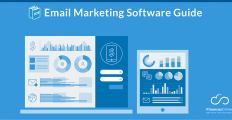With so many options on the market, choosing the right business process management software for your business can feel like a daunting task. But with a little research and planning, you can find a solution that will work for your company and help you achieve your business goals.
In this blog post, we’ll guide you through the process of selecting and implementing management software, from understanding the different types of software available to factors to consider before making a purchase. By following these steps, you can be confident that you’re choosing the right solution for your business.

Understanding the Different Types of Management Software
Business management software is a type of application software that helps users monitor and control various business operations. It typically includes a range of tools for managing different aspects of the business, such as finance, human resources, inventory, supply chain, customer relationship, and project management.
The purpose of management software is to streamline business processes and improve efficiency by automating tasks and providing real-time data visibility. It can also help businesses make better decisions by providing insights based on historical data and trends analysis.
Management software is usually delivered as a web-based or cloud-based solution, which allows users to access the system from anywhere using a computer or mobile device with an internet connection.
Some popular examples of management software include Salesforce, Oracle NetSuite, SAP Business One, Microsoft Dynamics 365 Business Central, Zoho One suite, and HubSpot CRM.
Importance of Implementing the Right Management Software
The right management software can help businesses save time and money by automating tasks, reducing errors and duplication of work, and improving communication between employees. It can also help businesses make better decisions by providing insights based on data analysis. In addition, the right management software can help businesses scale by allowing them to add new users and functionality as needed.
However, not all management software is created equal. It’s important to select a solution that fits the specific needs of your business in terms of features, pricing, deployment model (on-premise or cloud-based), user experience (UX), integration with other systems, and support options.
It’s also important to consider the total cost of ownership (TCO) when selecting a management software solution. The TCO includes the initial purchase price as well one-time implementation costs such as consulting fees and training expenses. It also takes into account ongoing costs such as subscription fees, maintenance costs, and upgrade costs.
Factors to Consider Before Implementing Management Software
The size of your business is an important factor when considering which management software to implement. If you have a small business, you may not need as robust or feature-rich of a solution as a larger business. Conversely, if you have a large business, you’ll need a business process management platform that can handle a high volume of data and users.
Budget
Your budget is another important consideration when choosing management software. Some solutions can be quite expensive, so it’s important to consider how much you’re willing to spend on the software. There are also some free and open-source options available, which can be a good option if you’re working with a limited budget.
Industry-specific needs
Another factor to consider is whether or not the software has industry-specific features that your business needs. For example, if you’re a hotel manager, you’ll need a hotel management system that can manage bookings, maintenance, room keys and more. If you’re in the retail industry, you’ll need software that can track inventory levels and sales data. It’s important to choose a solution that has the specific features and functionality that your industry requires.
Integration with existing systems
If your business already has some existing systems in place, it’s important to choose management software that can integrate with those systems. This will make it easier to transfer data between the different systems and avoid any duplication of effort. For example, if you have an accounting system in place, you’ll want to choose project management software that can integrate with it so that financial data can be easily shared between the two systems.
User-Friendliness
When choosing management software, it’s important to consider how user-friendly the interface is. The software should be easy to use and navigate so that employees can quickly learn how to use it. It’s also important to choose a solution that has good customer support in case there are any issues with using the software.
Types of management software
There are several types of management software available in the market that cater to the needs of various industries. Let’s explore some of the commonly used management software.
Project Management Software
Project management software is an essential tool for businesses involved in construction, engineering, and IT industries. This software helps plan, track, and manage projects from start to finish. It enables teams to collaborate, set timelines, assign tasks, and monitor progress, ensuring projects are completed efficiently and within budget.
Customer Relationship Management (CRM) Software
CRM software is designed to help businesses manage customer data, sales pipeline, and marketing campaigns. Sales and marketing departments use this software to keep track of customer interactions, prioritize leads, and automate follow-up tasks. CRM software also provides valuable insights into customer behavior and preferences, enabling businesses to create personalized marketing strategies.
Human Resource Management (HRM) Software
HR management software is a valuable tool for human resources departments to manage employee data, payroll, and performance reviews. This software streamlines HR processes, allowing HR teams to focus on more strategic initiatives. HRM software also facilitates effective communication between employees and management, ensuring that employee concerns are addressed in a timely and effective manner.
Inventory Management Software
Inventory management software is essential for businesses involved in manufacturing and retail industries. This software helps track inventory levels, reorder points, and supplier data. With inventory management software, businesses can optimize their inventory levels, reducing the risk of stockouts or overstocking.
Supply Chain Management (SCM) Software
SCM software is designed to help businesses plan production schedules, track shipments, and monitor supplier performance. It enables businesses to streamline their supply chain processes, reduce costs, and improve efficiency. SCM software also helps businesses respond quickly to changes in demand, ensuring that products are delivered to customers on time.
Factors to Consider When Choosing Management Software

Before making a decision on which management software to choose, there are several factors that you need to consider.
First, you need to determine the size of your business and find a software solution that is specifically designed for businesses of your size. Next, consider your budget and find a solution that fits within your financial constraints. If you work in a particular industry, look for software that caters to your industry-specific needs. For example, a church looking for a donation platform may need different tools than an ecommerce store would need to collect payments.
Additionally, ensure that the software can integrate with your existing systems to avoid having disjointed systems that don’t work together. Finally, select a software solution that is user-friendly and easy to learn, as complicated systems that no one knows how to use can create more problems than they solve.
Assessing Software Cost vs ROI
Once you have narrowed down your options, it’s important to assess the cost of the software against its potential return on investment (ROI). Consider the upfront costs, ongoing costs, ease of use, features and functionality, and integration with existing systems when comparing different options. This will help you choose the software that provides the best ROI for your business.
Understanding Agreement Terms
Before making a purchase, ensure that you read and understand the agreement terms. Pay attention to licensing fees, support fees, maintenance fees, and upgrade fees, as they can add up quickly. Knowing the terms of the agreement will help you determine what you are responsible for and what you are not.
Consulting with Employees and Business Stakeholders
Before making a final decision, it is essential to consult with employees and other business stakeholders who will use the software regularly. Their input is invaluable as they may have ideas on how to make the software work better for your specific needs. They will also be using the software on a daily basis, so their feedback is critical to the successful implementation and adoption of the software.
Implementing Management Software in Your Business
Once you have selected the right management software, it’s time to implement it into your business. Here are a few things to keep in mind when creating your implementation plan:
- Define the scope of the project and outline the timeline
- Set up a budget
- Assign roles and responsibilities
- Create communication channels
- Implement change management plans
Additionally, you will want to ensure that employees receive proper training before the rollout, and offer ongoing support after the software goes live.
Monitoring and Evaluating Performance
Once the software is up and running, it’s important to monitor its performance regularly. Establish key performance indicators beforehand so that you have a clear idea of what success looks like. Check in with employees regularly to see how they are finding using the system day-to-day.
Making Necessary Adjustments and Improvements
As you continue to use the management software in your business, be open to making adjustments or improvements as needed. This could be in response to changes in your business, feedback from employees, or simply as a result of getting more experience with the system. Be flexible and make necessary changes to get the most out of the software.
Conclusion
Choosing the right management software for your business requires careful consideration of various factors. However, by doing your research and following the tips outlined in this article, you can select the software that best fits your specific needs. With a solid implementation plan, a good set of productivity tools, and ongoing monitoring, your business can reap the benefits of efficient and productive management software.























Leave a comment!